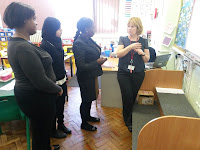 |
| Chris Knight guiding trainees' lesson planning. |
At Mawney, the school's digital leaders show trainees around, confidently demonstrating the technology and resources at their disposal. (While the school's pupil-run radio station broadcasts the latest music around the building.) The school demonstrates the impact that having a strong vision for ICT can have, when supported and implemented by skilled, motivated, committed staff. Today, a group observed a year 5 lesson in which pupils were required to review a book, and were given the opportunity to choose whether to write, type or record their reviews on flipcams. They then set about planning their session, confidently utilising the approach of the class teacher. Such experiences, observing and learning from outstanding practice, are invaluable during the initial teacher training year.
At Scotts Primary School, trainees also have the chance to obtain crucial hands-on practice in using classroom technologies, such as visualisers, pocket computers, wireless slates and interactive whiteboards. Having observed class teachers using technology to enhance teaching and learning in mathematics and English, trainees then talk to the class teachers about the rationale behind resource choices. They then go on to plan and teach follow-on lessons. Trainees particularly welcome the opportunity to talk to digital leaders about their experiences and preferences of curriculum based technologies, as this develops their understanding of pupils' interests and needs.
 |
| Caroline Jacyna showing trainees an online reading resource. |
Trainees visiting Engayne Primary School are always impressed with levels of engagement with different technologies (and how well behaved the children are using them). Interesting discussion takes place concerning the absence of interactive whiteboards, and why this may be a help rather than a hinderance to teachers. Trainees experience how the 2014 computing curriculum is being introduced in the school. They also experience using apps to make animated movies, as well as more traditional tools such as spreadsheets to assist with learning in mathematics.
The partnership developed between UEL and Havering allows trainee teachers to experience and reflect on teaching and learning in school settings where there is an established belief in the potential of technology. The schools involved are particularly committed to embedding technology across many aspects of school life. The experiences provide trainees with a deeper understanding of the creative potential of technology, and the confidence to utilise it in their teaching on their school-based block placements and beyond their training.
DJA
Thanks to the following people that have helped organize and run each day: Engayne - Sara Sankey; Mawney - Chris Knight; Scargill Junior - Karen Webley; Scotts - Jan Taylor; HSIS - Dave Smith
Thanks also to Gurmit Uppal and David Morris for contributing to this post.
Look out for the BETT Blog...
No comments:
Post a Comment
Please add your comments & views. No tricky verification required...
Regards, DJA